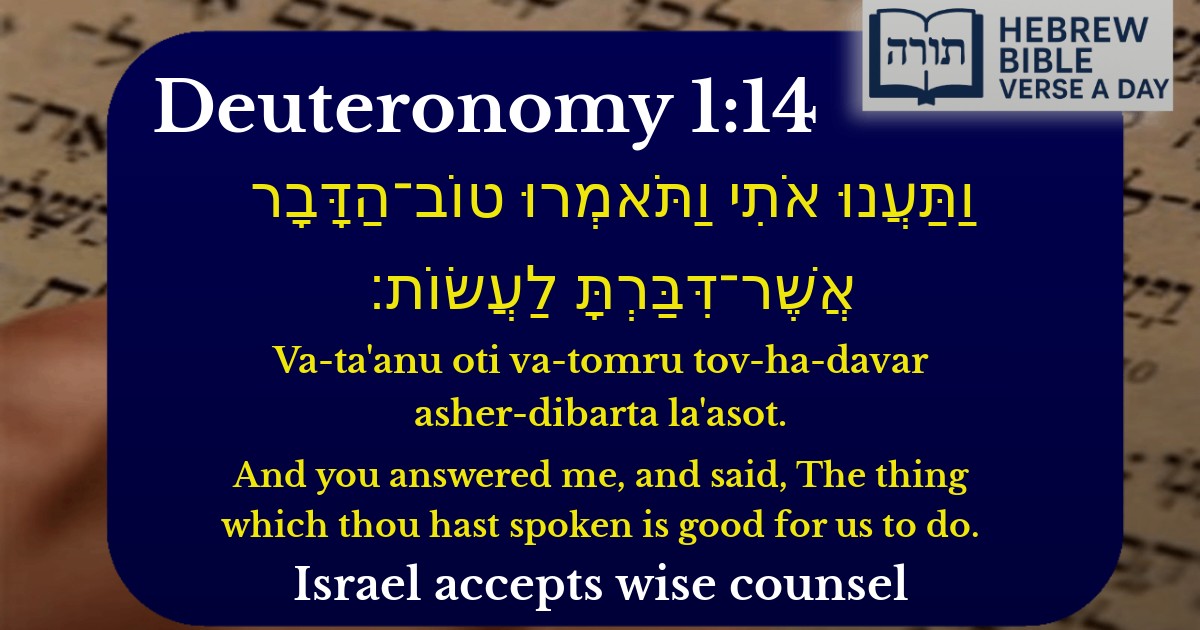Join Our Newsletter To Be Informed When New Videos Are Posted
Join the thousands of fellow Studends who rely on our videos to learn how to read the bible in Hebrew for free!
Hebrew Text
וַתַּעֲנוּ אֹתִי וַתֹּאמְרוּ טוֹב־הַדָּבָר אֲשֶׁר־דִּבַּרְתָּ לַעֲשׂוֹת׃
English Translation
And you answered me, and said, The thing which thou hast spoken is good for us to do.
Transliteration
Va-ta'anu oti va-tomru tov-ha-davar asher-dibarta la'asot.
Hebrew Leining Text
וַֽתַּעֲנ֖וּ אֹתִ֑י וַתֹּ֣אמְר֔וּ טֽוֹב־הַדָּבָ֥ר אֲשֶׁר־דִּבַּ֖רְתָּ לַעֲשֽׂוֹת׃
וַֽתַּעֲנ֖וּ אֹתִ֑י וַתֹּ֣אמְר֔וּ טֽוֹב־הַדָּבָ֥ר אֲשֶׁר־דִּבַּ֖רְתָּ לַעֲשֽׂוֹת׃
🎵 Listen to leining
Parasha Commentary
📚 Talmud Citations
This verse is not quoted in the Talmud.


Context in Devarim (Deuteronomy)
The verse (Devarim 1:14) appears in Moshe's recounting of the events at Har Sinai, where Bnei Yisrael accepted the responsibility of fulfilling the Torah. This response follows Moshe's instruction to appoint wise and understanding leaders to assist in judging the people (Devarim 1:13).
Rashi's Explanation
Rashi explains that Bnei Yisrael's response, "טוב הדבר אשר דברת לעשות" ("The thing which you have spoken is good for us to do"), demonstrates their willingness to accept Moshe's directive with humility and enthusiasm. They recognized the wisdom in delegating judicial authority to qualified leaders rather than burdening Moshe alone.
Ibn Ezra's Insight
Ibn Ezra emphasizes that the phrase "טוב הדבר" ("The thing is good") reflects the people's acknowledgment of Moshe's leadership and their trust in his judgment. Their agreement was not passive but an active affirmation of the necessity for an organized judicial system.
Midrashic Perspective
The Midrash (Devarim Rabbah 1:10) highlights this moment as a model of proper communal conduct. By agreeing to Moshe's proposal, Bnei Yisrael demonstrated:
Rambam's Halachic View
Rambam (Hilchot Sanhedrin 1:1) derives from this verse the foundational principle that the appointment of judges is a communal obligation. The people's affirmation ("טוב הדבר") establishes that a functioning judicial system is not optional but essential for a Torah society.
Spiritual Lesson
The Sforno teaches that this episode illustrates the importance of קבלת עול מצוות (accepting the yoke of mitzvot) with a positive attitude. Bnei Yisrael's ready agreement ("טוב הדבר") serves as a model for how we should approach Torah obligations—with joy and recognition of their inherent goodness.